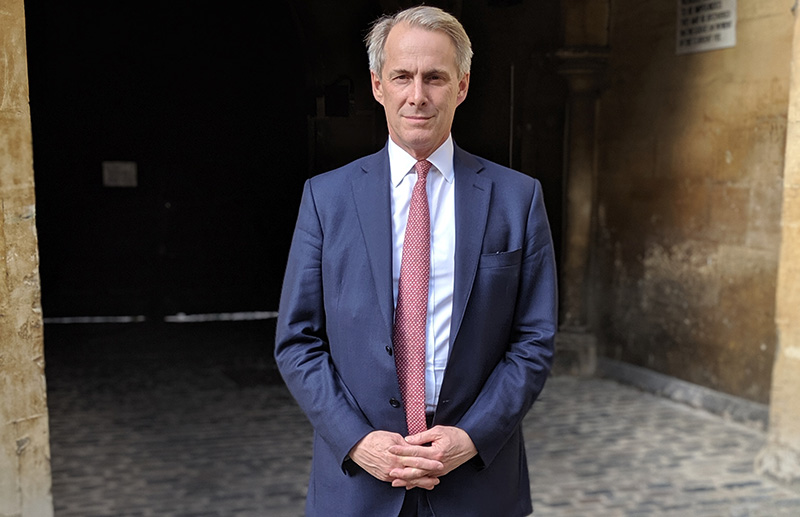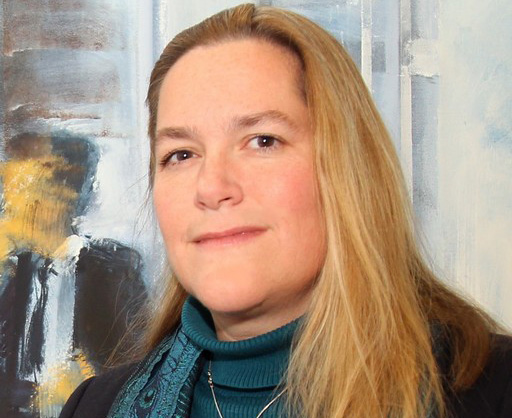Rector Trainor reports on events of Trinity Term 2020
Trinity Term 2020 at Exeter, despite COVID-19, was largely tranquil – but then, just after term ended, a tragedy occurred.
On 22 June Peter Warner, Finance and Estates Bursar since late last summer, died suddenly. The loss to Peter’s family is of course severe; the loss to Exeter is also great. Peter made his mark on the College not only through his ability to grapple with a very broad range of issues but also through his enthusiasm for the social aspects of College life. What Exeter meant to Peter, and Peter to Exeter, has been evident in tributes both from students and colleagues. A memorial service will be held in the College Chapel as soon as pandemic-related regulations permit, probably next Hilary Term.

Peter Warner, who sadly died on 22 June
The College has rallied round in the aftermath of Peter’s death; that positive attitude has characterised Exeter during Trinity Term as a whole. Virtually everyone has been working from home rather than from College; there had been understandable anxieties about how Exeter’s Fellows, staff and students would cope with online tutorials and exams. In practice, although there were difficulties, they were surprisingly few. College committees as well as tutorials adjusted to Teams and Zoom, albeit with fatigue after days spent staring at computer screens! Rector’s Collections were adapted to the new medium, as was a well-subscribed programme of academic review sessions for graduate students. The welfare team dealt effectively, though necessarily at a distance, with student problems. I am delighted to report that alumni responded enthusiastically to our recent appeal to help students affected by the pandemic during this highly unusual Trinity term. We have received over £45,000 in donations from 166 alumni and many messages of support for our students. These gifts have been used to ensure that all students were adequately prepared for home learning, with all the equipment, books and materials they needed. There were several individual cases of specific hardship that we were also able to address. We are very grateful for these gifts and the continued support of our alumni during this uncertain time.

A mathematics tutorial takes place over the internet using MS Teams
The College also dealt with many other issues. Exeter welcomed its selection as the academic home of the University’s new Deep Mind Chair in Artificial Intelligence. Also, the College’s Library and Archives completed the donation-aided digitisation (now available on Medieval Bodleian: https://medieval.bodleian.ox.ac.uk/) of Exeter’s catalogue of medieval manuscripts.
On the policy front, the College tightened the freedom of speech requirements governing conferences organised by third parties on Exeter premises. Turning to financial matters, many members of staff have participated in the Government’s furlough programme, mitigating the non-trivial impact of the pandemic on Exeter’s finances. Meanwhile, we were pleased to receive an encouraging preliminary report, on the prospective restoration and renovation of the College Library, from the local conservation and planning authorities. Also, Governing Body approved a new outreach strategy designed to attract additional high-quality applicants from backgrounds under-represented at Exeter. Last but not least, the College launched a working group, including undergraduates, graduate students and Fellows, to consider practical steps relating to Black Lives Matter.
The College’s strategy for the next ten years may be found on the College website here. Sitting alongside this is an ambitious draft fundraising plan, which aims to raise funds to support a variety of academic and non-academic key priorities. These include raising money for Tutorial Fellowships, postgraduate scholarships, enhanced financial support for undergraduates, access and outreach initiatives. There are a number of capital projects planned, the library refurbishment being the main one but we also intend to refurbish the College’s Boat House, the College Lodge, and a number of staircases all designed to improve the working and living environment of the College. Accessibility and environmental sustainability will also be key considerations in these projects.
The absence of Trinity Term’s usual social occasions – such as the College Ball, Summer Eights, Schools Dinners, and the Leavers’ Parents’ Lunch – left a huge hole, especially for students in their final year. However, the JCR devised virtual study and social events so creative that they attracted favourable attention in Oxford’s student press. The MCR, too, had an active programme of online activities. The relatively small number of (mainly international) students still in College accommodation adapted to a subdued social scene, and the majority of their colleagues readjusted to life at home. Meanwhile, the Chaplain and Choir produced a dazzling array of recorded services which attracted a substantial number of alumni as well as student listeners.

A live music night was one of many online events Exeter’s students organised during Trinity Term
The College’s ‘CV Group’ – coordinating Exeter’s response to the pandemic – has provided a crucial link between the College and the large quantity of ‘guidance’ emanating from the Government, the University and Oxford’s Conference of Colleges. Now that term has ended, the CV Group has a key role to play in orchestrating college-level planning for next academic year. At Exeter, as throughout Oxford, the plan is for students to return to living in College and to attendance at in-person tutorials and labs; only large group teaching is likely to be online. Given the possible persistence of some social distancing requirements throughout academic year 2020/21, Exeter is planning its academic, residential and social arrangements in innovative detail.
Meanwhile, Exeter has continued to help alleviate the problems posed by the pandemic. The College sends regular food deliveries to a local food bank. Senior research fellow Professor Cath Green is a key member of the Oxford team aiming to produce an effective vaccine, as explained in the absorbing online talk she gave on 18 June to Exeter’s major benefactors. Also, many of the College’s research students in the biosciences have adapted their work to the crisis. The College’s medical fellows, too, have been involved through frontline medical care. The same is true of many of our alumni who work in health professions. Exonians in other occupations are also making their contribution to dealing with the crisis. For example, former Ohio Governor Dick Celeste (1960, History) is in charge of his state’s COVID testing task force, and Marie-Claire Condonier Segger (2003, Law) has organised online Oxford-style tutorials for school children.

Marie-Claire Cordonier Segger organised online Oxford-style tutorials for school children during lockdown
Exeter’s Fellows had an arduous Trinity Term, mounting online teaching while (in many cases) shouldering childcare and home schooling duties. Yet there were major individual achievements. Most spectacular was the Turner Bursary awarded to Oreet Ashery (Fine Art), whose work ranges across ‘moving image, performance, photography, workshops, writing and assemblages’. Virologist Professor Ervin Fodor, who works on new strategies to fight influenza, was elected a Fellow of the Academy of Medical Sciences. Professor Andrew Farmer (General Practice) was appointed Director of the Health Technology Assessment Programme of the National Institute of Health Research. Meanwhile, Dr Natasha Simonova (English Literature) and Lecturer Dr Emily Oliver (German) gave scintillating virtual talks on their research to Senior Common Room audiences. The one Rector’s Seminar of the term occurred on 27 May, also virtually, when Visiting Fellow Professor Alexander Bird (King’s College London) spoke engagingly about the value of imagination in the arts and in the sciences. Finally, Dr Neil Herring (Physiology), Exeter’s new Fellow in pre-clinical medicine, became the first Exeter Fellow ever to be inducted virtually!
Turning to alumni news, Exonians have been making their mark, as ever, in a variety of fields. Marie-Claire Cordonier Segger was named a winner of the Weeramantry International Justice Award. Jonathan Hall (1992, Physics & Philosophy) was appointed, against stiff competition, an external member of the Bank of England’s Financial Policy Committee. Sir Ronald Cohen (1964, PPE) published Impact: Reshaping Capitalism to Drive Real Change; he attracted a large virtual audience in his talk on that theme to Exeter alumni on 30 June. There has also been a virtual Gaudy, adapting to the fact that two recent Gaudies have had to be postponed because of the pandemic. Virtual alumni events have proven very popular and will continue even after normal conditions resume. Nonetheless, we are eagerly anticipating, once social distancing requirements are substantially eased, welcoming Exonians back to Oxford (not least for the graduations which will resume in 2021) and visiting you in the various cities and countries where you live.
Marguerite and I – who have punctuated our in-College lockdown with vigorous walks around Oxford – look forward to seeing many of you next academic year. We hope that you enjoy the summer and keep safe and well.
Rick Trainor
Rector
